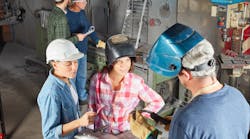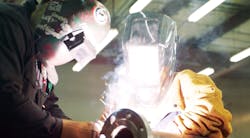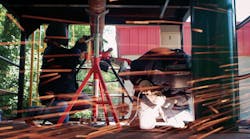Latest from Training
Sponsored
Over the last couple of years, much has been written on diversity and inclusion in the workplace. The societal outrage and civic unrest that exploded in the summer of 2020 has spurred efforts to address the issues of racism and sexism in this country in areas such as criminal justice and employment.
The construction industry is not immune to these issues. Only 6.3 percent of construction workers are Black, and 32.6 percent are Hispanic or Latino (www.bls.gov/cps/cpsaat18.htm). In the skilled trades, women comprise 10 percent of workers when they comprise half of the national workforce.
We have a tremendous opportunity to bring more women and minorities into skilled trade construction jobs to boost the industry's long-term health, which has been saddled with a skilled labor shortage over the last few decades. During the COVID-19 pandemic, the construction industry lost one million workers due to initial lockdowns and stay-at-home orders.
And while many of those workers have returned to work, the industry unemployment rate was 6.7 percent in February (www.bls.gov/iag/tgs/iag23.htm#workforce). And more baby boomers retire from construction jobs every year, compounding the issue. Hiring a more diverse workforce could help alleviate the problem.
Opening the Door
So how do we attract more women and minorities to the plumbing and heating trades? Education and awareness.
“When you see people like you working in welding or HVAC, you say, ‘OK, I can do that too,’” explains Mary Kelly, CEO and president of StrataTech Education Group (www.stratatech.com). “That's just a natural inclination. I believe StrataTech has more women teaching for us than most skilled trades organizations. We try to make sure we have a good proportion of people of color on our staff. Because, once again, when you see someone like you, you know you can do it.”
StrataTech owns the Tulsa Welding School (Tulsa, Okla.; Jacksonville, Fla.; and Houston) and The Refrigeration School in Phoenix. Teachers are required to have worked in the field for five years and pass a comprehensive test.
Kelly, who has a teaching background, notes that the key to attracting a diverse group of candidates to the skilled trades is debunking the myth that you can only get a good-paying job by getting a college degree.
“All these people with massive amounts of student loans they can't pay back; they were told that something was wrong with them if they don’t get a four-year degree,” she says. “Some of the smartest people I know work in the skilled trades.”
Welding is a “passion program,” Kelly adds. “People are excited about it because their granddaddy or whoever in their family was a welder, or they did it on the farm. HVAC is a little harder to make sexy like welding, but it’s a viable career and you can make as much, or more, than someone with a degree.”
A New Approach to Work
Young people who watched their parents lose jobs during the pandemic are looking at their career prospects in a different light. What can they do that is vital to their communities, recession-proof and pandemic-proof, and allow them to provide well for themselves and their families?
“That awareness needs to start in the very early days of school,” Kelly notes. “If you look at other countries such as Germany, students learn these skills in high school. They have apprenticeships that are built into the high school curriculum. No matter what you do, it's honorable. So, that has to be part of the story.”
Whether enrolled in the welding or HVAC program, StrataTech students are in class five hours a day, allowing them to work if needed. Each day, they have one hour for classroom instruction, then four hours in the lab.
The organization placed 3,000 graduates into welding and HVAC jobs in 2021; in 2020, during the height of the COVID-19 pandemic, the group placed 1,800 graduates in critical infrastructure jobs.
“For me, that's a compelling mission—our students and other trades students are vital to the American economy,” she says.
Focus on Women
In the past, a skilled trades career wasn’t an option for women—it wasn’t feminine, the work was dirty, the male workers were rough. Today, they have opportunities for better-paying work in male-dominated industries. “However, we still have quite an uphill battle to get women into the skilled trades,” Kelly notes.
For example, she says, a single mom who needs a steady, well-paying job to take care of her kids could go from a $13/hour medical assistant job to a $25/hour trades job. “And the wage gap for women in the skilled trades is 95.7 percent compared to nationally at 82 percent,” she explains.
StrataTech offers scholarships to women interested in short-term welding or refrigeration programs. It partnered with the Architecture-Construction-Engineering Mentor Program (www.acementor.org) and its diversity program.
The organization uses women, Blacks and Hispanics in its marketing campaigns to illustrate the diverse makeup of its students. A diverse group of representatives visit high schools and give seminars on skilled trades careers; if a student is interested, they may do a home visit and talk with the parents.
In honor of Women’s History Month, StrataTech produced a video celebrating women in the skilled trades. You can view the “HERstory: Women in Trades” video at www.youtube.com/watch?v=uu0ehxOjHyE.
Kelly notes that employers are looking for women to fill those skilled positions—while men are (typically) stronger, women in general pay more attention to detail.
“I have welding and HVAC employers begging me for female workers,” she says. “When we put women through our HVAC or welding schools, they already have jobs before they leave the program.”
Kelly Faloon is a contributing writer to Contractor magazine and principal of Faloon Editorial Services. The former editor of Plumbing & Mechanical magazine, she has more than 20 years of experience in the plumbing and heating industry and more than 30 years in B2B publishing. Faloon is a journalism graduate of Michigan State University.

Kelly L. Faloon | Freelance Writer/Editor
Kelly L. Faloon is a contributing editor and writer to Contractor, Contracting Business magazine and HPAC Engineering and principal of Faloon Editorial Services. The former editor of Plumbing & Mechanical magazine, Faloon has more than 26 years of experience in the plumbing and heating industry and more than 35 years in B2B publishing. She started a freelance writing and editing business in 2017, where she has a varied clientele.
Faloon spent 3 1/2 years at Supply House Times before joining the Plumbing & Mechanical staff in 2001. Previously, she spent nearly 10 years at CCH/Wolters Kluwer, a publishing firm specializing in business and tax law, where she wore many hats — proofreader, writer/editor for a daily tax publication, and Internal Revenue Code editor.
A native of Michigan’s northern Lower Peninsula, Faloon is a journalism graduate of Michigan State University. You can reach her at kelly@falooneditorialservices.com.




